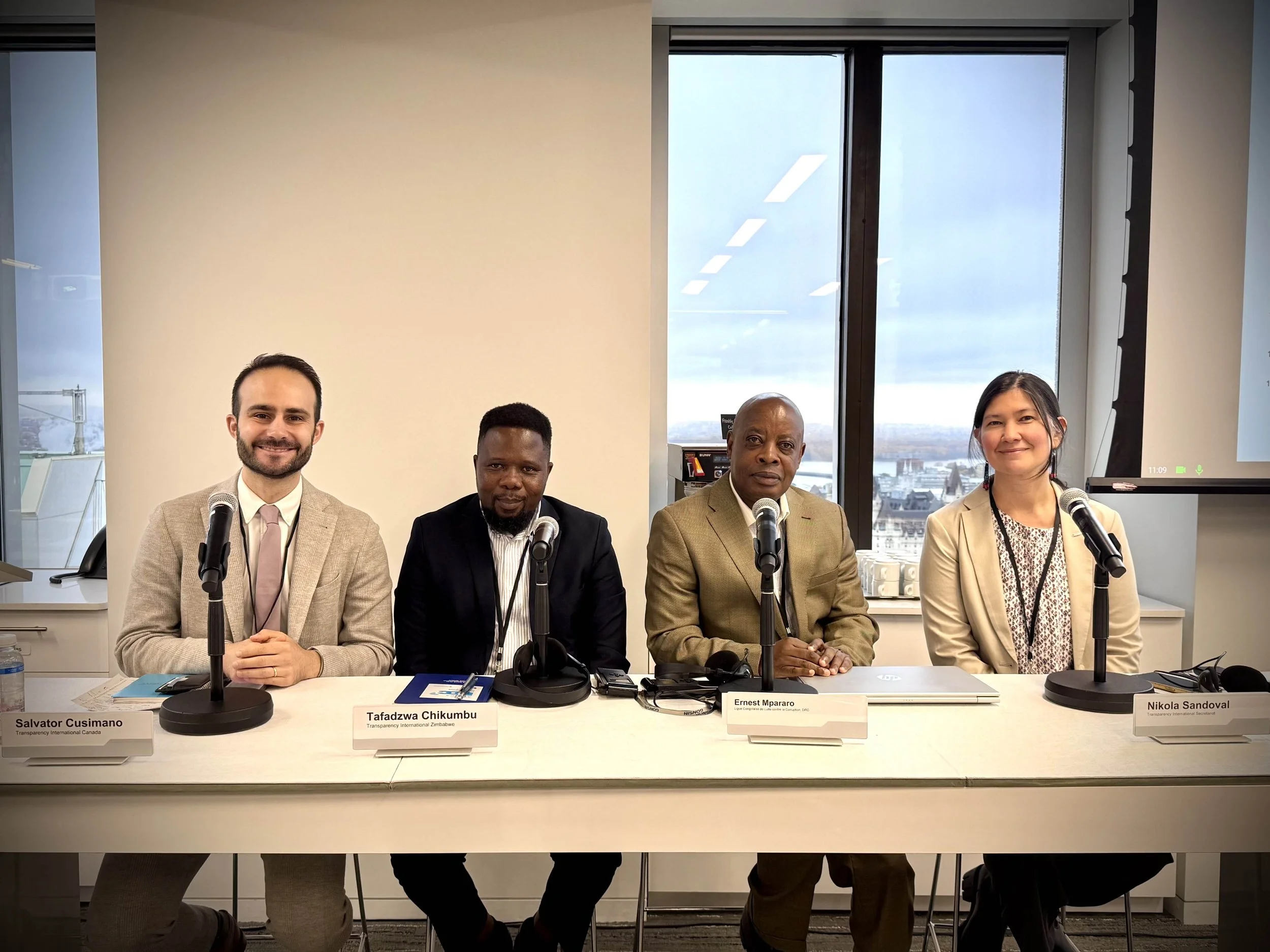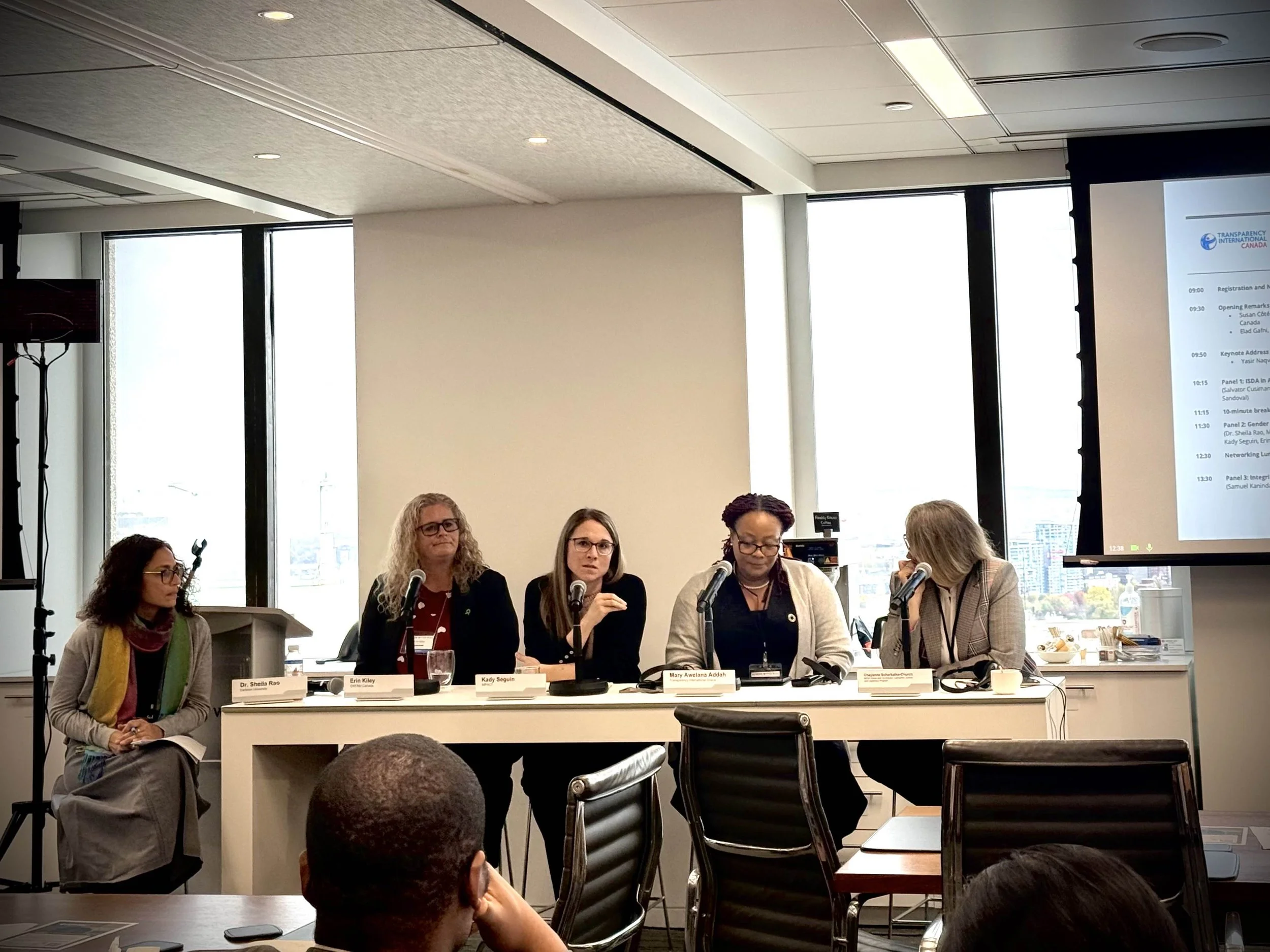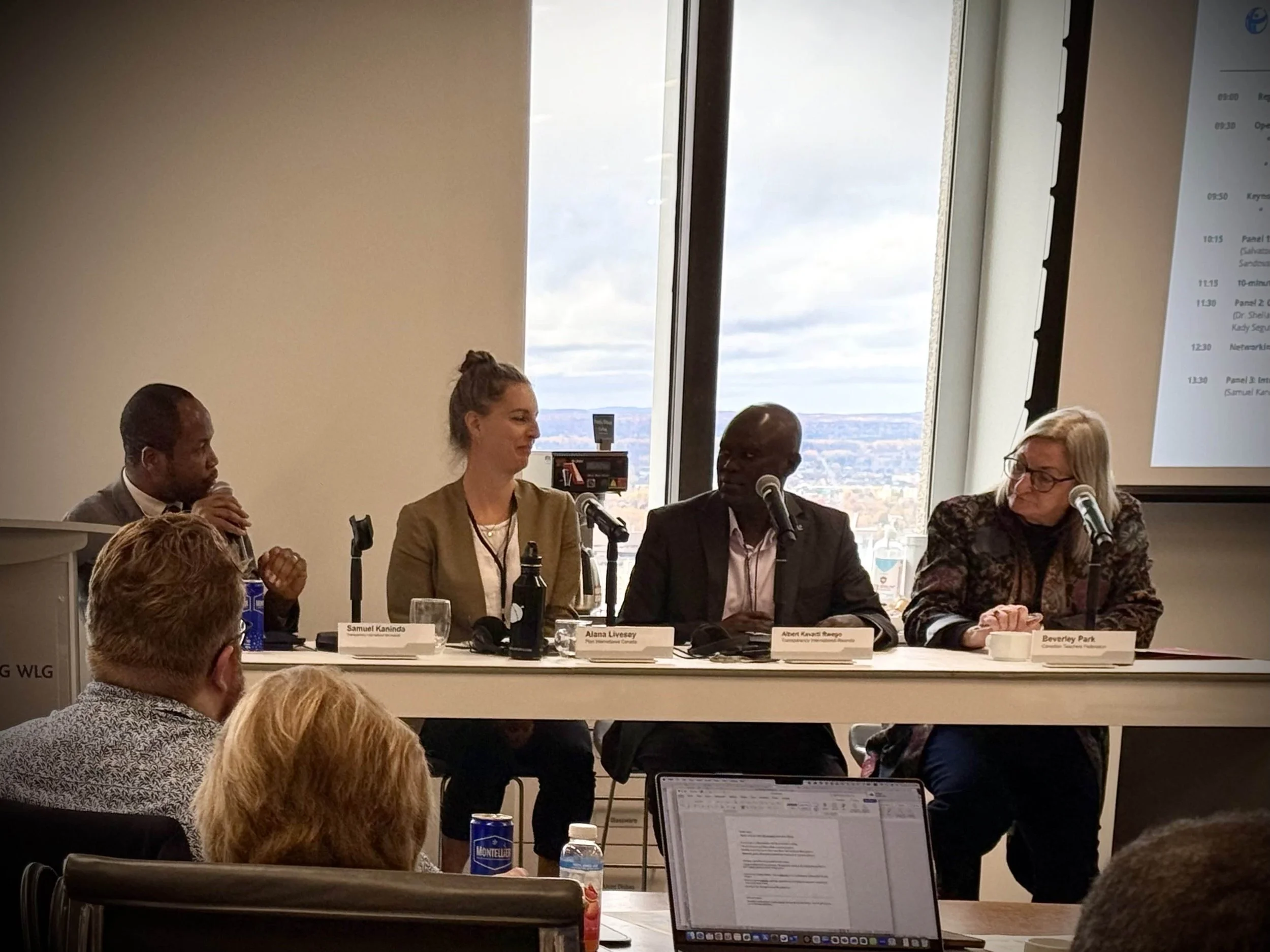
inclusive service delivery africa (ISDA)
Lessons from the field
Background: Democratic Republic of Congo |Johnnathan Tshibangu, Unsplash
Post-Conference Recap
Panel 1: ISDA in Action
Our panel (from left to right): Salvator Cusimano (Moderator and Executive Director, Transparency International Canada), Tafadzwa Chikumbu (Executive Director, Transparency International Zimbabwe), Ernest Mpararo (Executive Director, Ligue Congolaise de Lutte contre la Corruption), and Nikola Sandoval (Regional Programme Manager, Transparency International Secretariat).
At Thursday’s ISDA in Action panel, partners from across Africa showed how corruption and discrimination combine to limit access to health and education - especially for women, girls, people with disabilities, and people living with HIV.
From functioning complaint mechanisms that resolved over half of reported cases, to new integrity committees and parliamentary inquiries tackling corruption at its source, the discussion revealed both the human cost and the policy solutions that work.
Panelists also spoke honestly about the challenges that are keeping people out - political mistrust that makes reform sensitive, fear of retaliation where no whistleblower protection exists, social norms that normalise “facilitation” payments, and the rise of sexual corruption (sextortion).
Panel 2: Gender Mainstreaming and Social Inclusion
Our panel (from left to right): Moderator: Dr. Sheila Rao (Carleton University), Erin Kiley (Director, International Programmes, Oxfam Canada), Kady Seguin (Research and Policy Director, Impact), Mary Awelana Addah (Executive Director, Transparency International Ghana) and Cheyanne Sharath-Church (Executive Director, Besa Global).
At Thursday’s Gender Mainstreaming and Social Inclusion panel at the Inclusive Service Delivery Africa (ISDA) – Lessons from the Field Conference, experts explored how corruption and gender inequality reinforce one another to restrict access to education, health care, and livelihoods. Their message was clear: addressing corruption without addressing gender is incomplete.
Erin Kiley (Oxfam Canada) drew from humanitarian practice to show how gender equality and integrity can advance together. By involving women in managing water and sanitation committees in Somalia and Malawi, Oxfam has improved transparency, accountability, and community trust - turning leadership into a safeguard against corruption.
Kady Seguin (Impact) discussed corruption risks in artisanal and small-scale mining. In informal sectors, women often face harassment, extortion, and sextortion to access land and markets. Her work highlights the need for gender-responsive policies that protect women’s livelihoods and give them collective power to challenge exploitative systems.
Mary Awelana Addah (Transparency International Ghana) shared findings that reveal the human impact of corruption at the point of service delivery. Payroll manipulation, teacher absenteeism, and procurement collusion in Ghana’s education system drain resources that could build classrooms and improve learning outcomes. In health care, corruption in the National Health Insurance Scheme weakens access and trust - with women and girls representing 70% of those affected.
Cheyanne Scharbatke-Church (Besa Global) examined how social norms shape corruption. Her research in the DRC showcased that female judges were denied promotion because they were seen as “unreliable” in corrupt networks - a reminder that gender bias operates within systems of corruption. She also cautioned that communications must reinforce integrity, not normalise misconduct.
The panel demonstrated that corruption is not gender-neutral - it is shaped by social norms, informality, and power structures that marginalize women and girls across sectors from education to mining. Speakers underscored that effective anti-corruption efforts must confront these gendered barriers head-on by making integrity systems inclusive, locally grounded, and responsive to the realities women face every day.
Panel 3: Integrity in Educational systems
Our panel (from left to right): Moderator: Samuel Kaninda (Regional Advisor, Africa, Transparency International Secretariat), Alana Livesey (Lead, Gender Equality and Inclusion | Responsable principale en égalité de genre et inclusion, Plan International Canada), Albert Rwego Kavatiri (Speaking for Apollinaire Mupiganyi, Program Manager, Transparency International Rwanda) and Beverley Park (Director, International and Social Justice, Canadian Teachers Federation).
Corruption in education is not only financial - it is deeply gendered, often taking the form of “sex-for-grades,” favoritism, and abuse of power that deny girls and boys equal access to safe learning. Tackling it requires systemic action that links community accountability, legal reform, and survivor-centred reporting within schools. The panel made clear that fighting corruption in education is inseparable from advancing gender equality and restoring trust in public institutions.
Moderator (Samuel Kaninda) - framed the education crisis within the broader SDG and gender equality agenda, emphasizing that corruption worsens existing barriers like child marriage and early pregnancy. They called for practical, collective responses that move beyond statistics to shared accountability among governments, teachers, and parents. Their closing message warned against normalizing corruption or gender-based violence, insisting that silence and tolerance are themselves forms of complicity
Alana Livesey (Plan International Canada) - illustrated how corruption and gender-based violence intersect in schools across Tanzania, where teachers and community members exploit power over girls and boys. She outlined Plan International’s gender-transformative model of addressing root causes through youth empowerment, community engagement, safe infrastructure, and coordinated reporting systems. She emphasized that prevention and response must go hand in hand, anchored in rebuilding trust between students, families, and schools.
Albert Rwego Kavatiri (Transparency International Rwanda) showed how TI Rwanda has institutionalized anti-corruption mechanisms in schools, from student suggestion boxes to empowered Parent-Teacher Associations. He detailed the successful advocacy that led Rwanda to recognize “sexual corruption” as a legal form of corruption - an achievement that reshaped accountability across the education sector.
Beverley Park (Canadian Teachers’ Federation) - highlighted that corruption and power abuse can exist even within teacher unions, where women remain underrepresented in leadership. She emphasized transparency in partnership agreements, gender quotas for leadership, and ethical training for educators as ways to prevent misconduct. She warned that society is becoming desensitized to gender-based violence, which underscored the moral urgency of naming and confronting corruption in all its forms.
This panel demonstrated how cross-sector collaboration such as among civil society, unions, and development partners can translate integrity principles into tangible, school-level reforms. It revealed that naming and addressing “sexual corruption” directly is both a human rights imperative and a governance breakthrough. Ultimately, it showed that education integrity is achievable when communities, governments, and teachers share ownership of accountability and act on evidence with courage and transparency.
Panel 4: No health system is immune: integrity in health service delivery
Our panel (from left to right): Moderator: Dr. Foluso Ishola (Board of Directors, Canadian Public Health Association), Sophie Campbell-White (Senior Programme Development Officer, Transparency International UK, Global Thematic Networks), Céleste Thériault (Executive Director, National Indigenous Diabetes Association), Nafissatou Diop (Senior Program Specialist, Global Health, IDRC) and Joining us from Madagascar through zoom Andriamananjara Gérald Pruvot (Health Project Office, Transparency International Madagascar).
Corruption in health systems is universal, taking different forms from informal payments in maternal care to opaque procurement - even in high-income countries. Transparency only works when paired with accountability, enforcement, and an explicit equity lens that protects those most affected. The most sustainable solutions combine political will, participatory co-design, and well-resourced technology that’s appropriate to context.
Dr. Foluso Ishola (Moderator) - Framed the discussion around three questions: who holds power, who is accountable, and who is affected and emphasized that corruption - whatever its form - erodes trust, access, and ultimately costs lives.
Gerald Pruvot (TI Madagascar) – Zoomed in on the conference to show how “gratitude” payments in maternal care become normalized, delaying or denying services for poor women. Highlighted ALAC-style reporting and community education as practical accountability tools. Pointed to institutional gaps and patriarchal norms as root drivers that require gender-responsive remedies.
Sophie Campbell-White (TI UK, Global Health Program) - Explained how opaque procurement and weak supply-chain oversight directly undermine patient care, citing pandemic lessons. Recommended e-procurement, open contracting, and price benchmarking - if they’re properly funded, used, and audited and stressed that transparency must translate into enforcement and consequences.
Céleste Thériault (National Indigenous Diabetes Association) - Drew clear parallels between international cases and systemic inequities facing Indigenous peoples in Canada. Warned that “transparency without equity” risks performative fixes amid chronic underfunding and mistrust. Called for true co-development and relational accountability to confront racism and close care gaps.
Nafissatou Diop (IDRC) - Outlined an implementation-research model that embeds transparency by design - pairing researchers with decision-makers, civil society, and Canadian partners from the start. Framed “capacity strengthening/bridging” as mutual learning, not one-way transfer. Showed how linking evidence to policymakers and parliamentarians increases uptake and accountability.
This panel demonstrated cross-context collaboration where TI chapters, Indigenous leaders, researchers, and funders can surface shared problems and practical fixes. Technology is a useful tool, not a cure: without resources, safeguards, and user inclusion, it can create new risks. Lasting progress depends on political will, community voice, and enforcement that turns transparency into better, safer care.




